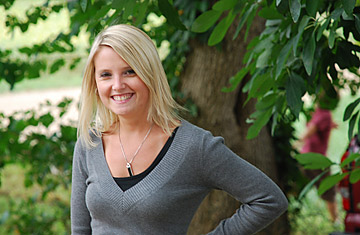
Erin Merryn
(2 of 2)
For a long time, Merryn didn't know what to do with her anger and fear as an abused child. She spent one afternoon at a park breaking discarded bottles. She didn't tell any adults what had happened to her. "I didn't realize that what had happened wasn't my fault. I didn't know the difference between a safe and an unsafe secret," Merryn says. Later, she helped herself heal by writing two books about her experiences (Stolen Innocence and Living for Today).
Now she is moving into political action. Earlier this year, Merryn reached out to Illinois legislators about the need for schools to adopt age-appropriate curriculum on child sexual abuse. Republican state senator Tim Bivins championed what became known as "Erin's Law," which passed the state senate unanimously. The legislation, which is expected to be taken up by the House in November, would create a task force to devise strategies for reducing child sexual abuse throughout the state and permit school boards to implement similar measures. The aim is to bring into the classroom (for students from pre-K through fifth grade) what is seldom discussed openly: that even trusted family members and friends can pose a threat to their well-being. Teachers would also be trained to recognize warning signs that their students have been sexually abused, including mood swings or acting distant at odd times, and be able to tell students where to go for assistance if they have been victimized.
A poised and charismatic speaker, Merryn has traveled the country making speeches to law-enforcement and abuse-prevention groups. And she will soon tell her story on Oprah, which she hopes will give her effort the jolt it needs to become a nationwide movement.
Erin's Law would not be the first statewide effort to tackle this issue. Ohio and New Jersey have statewide mandates to implement abuse-prevention programs in their schools, according to Finkelhor, and Texas passed a similar prevention measure in 2009. The problem, Finkelhor says, is getting schools to focus on the issue at a time when resources are limited and their priorities are on beefing up academic programs — which has put ancillary efforts such as anti-bullying and mental-health issues on the back burner. "I don't think schools would be resistant to the idea that this prevention is needed," he says. "But there are so many other demands on them these days." Nor are they likely to have the resources to provide the kind of intensive curriculum that is necessary. A guest speaker for 45 minutes wouldn't be very helpful, says Finkelhor: "The best programs are very intensive and expensive."
The attention on sexual abuse of children in recent years, along with increases in the numbers of law-enforcement and child-protection personnel, has made an impact. According to Finkelhor, national child maltreatment data show that the rate of sex abuse against children under 18 declined 58% between 1992 and 2008, when the number of substantiated cases was reported to be a still disturbing 68,500. As Finkelhor notes, "It's still a major source of trauma and long-term dysfunction in children."
Merryn, who got a master's degree in social work, focusing on sexual-abuse prevention, is determined to keep up her campaign to make her cause a national movement. "I don't want parents to think they need to put a bubble around their kids 24/7," she says. "We need to give kids the knowledge and tools they need to come forward when something happens. I had my innocence taken. I don't want it to happen to anyone else."
